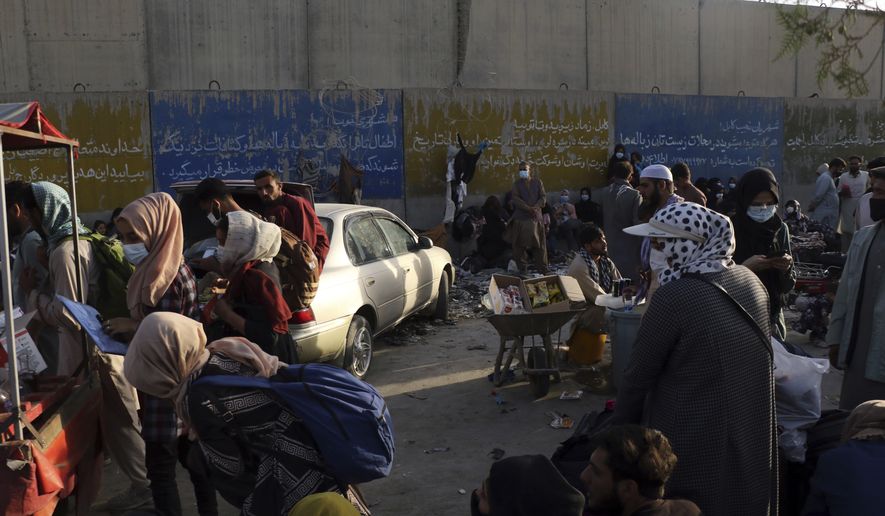Lawmakers and veterans groups are working feverishly around the clock to help as many U.S. citizens and refugees as possible get out of Afghanistan before President Biden’s withdrawal deadline Tuesday.
Calls pour in from Americans frantically trying to make it through the chaos engulfing the Taliban-controlled country and to the Kabul airport, where twin bomb attacks Thursday killed dozens — including at least 13 U.S. service members — and further hampered people’s escape plans.
Rep. Michael Waltz, Florida Republican and a former Army Green Beret, said he and other lawmakers have devoted their entire staff to “connecting the dots and doing what needs to be done” to assist trapped Americans.
“We’re having to fight through our own bureaucracy to help fellow Americans and to help those who stood with us,” he said. “Just think about that for a moment: how the private sector has had to mobilize to get this done because our government isn’t getting it done.”
The U.S. military controls only the perimeter of Hamid Karzai International Airport. Taliban checkpoints dot the city. Tens of thousands of people gather outside of the airport gates, grinding passage to a halt.
Every attempt to flee the city poses a substantial risk for U.S. citizens and Afghan refugees alike.
The Taliban have circled the Kabul airport. They were letting American citizens into the airport, but Afghan interpreters and others who worked alongside the U.S. military were being turned away, said Rep. Michael T. McCaul of Texas, the top Republican on the Foreign Affairs Committee.
“Sometimes, more grimly, they are returned to their homes where they behead their family and then behead them,” Mr. McCaul said.
Rep. Andy Kim, New Jersey Democrat and a former State Department diplomat who served as a civilian adviser in Afghanistan, said more than 6,000 people had reached out to his office for help in getting out of Afghanistan.
“I spent several hours this morning just trying to help several American citizens that are still trying to get to the airport, still trying to get help,” Mr. Kim said.
Others trapped in Afghanistan turn to the Americans they knew during the war to lend a hand. As Afghanistan fell to the Taliban in mid-August, Afghan interpreters began making calls to former U.S. service members, pleading for help to get out.
Brandon Trent, a former Marine, said he received several calls like that.
“It is tough to ask a man to take his family at 2 in the morning through a crowd of 20,000 just to get them to the gate,” Mr. Trent said.
He said many of the interpreters would be met with beatings at Taliban checkpoints. It was common, he said, for the Taliban to confiscate the documents they needed to make it out of the country.
Mr. Trent and other former U.S. service members began coordinating efforts, exchanging tips and real-time guidance on how to navigate the Taliban checkpoints.
The mission became known as Digital Dunkirk and eventually grew into a network of several hundred former service members.
Dunkirk, a French seaport, was the site of a massive evacuation of British and allied troops during World War II, saving more than 200,000 troops from advancing German forces.
“Suddenly, you know, two people became four people became two or three nuclei of six or seven people who started joining up,” said Benjamin Bryant, a former Department of Defense civilian involved in the initiative. “You get a lot of people with a lot of trust with a lot in common, working day and night to get stuff done.”
While they have been able to get many to the airport and out of the country safely, those involved say they are nowhere near completing the job — much like their former colleagues who are still in uniform.
The U.S. evacuation effort at Kabul airport has flown nearly 100,000 people out since full-scale operations began on Aug. 14. At least 1,500 Americans remained in the country, the State Department said Wednesday.
The former military involved in helping Afghan allies said they don’t know how many of them are stuck in Kabul or elsewhere in the country. The number is in the tens of thousands.
“It’s mission first,” Mr. Bryant said. “And right now the mission is to facilitate the evacuation and extraction when necessary of as many people as possible.”
• Joseph Clark can be reached at jclark@washingtontimes.com.




Please read our comment policy before commenting.